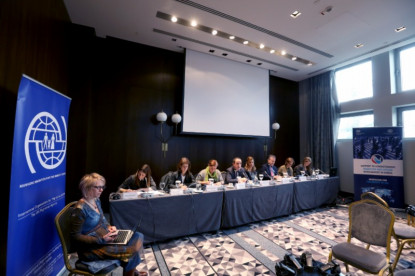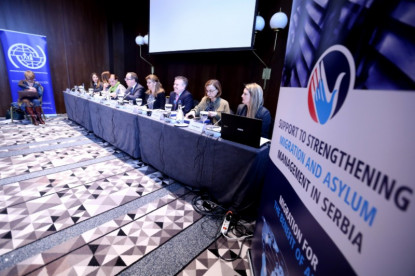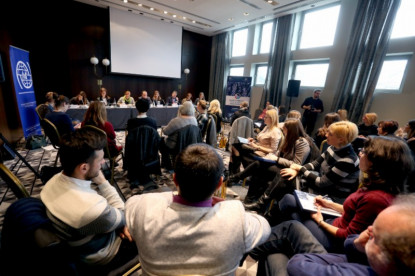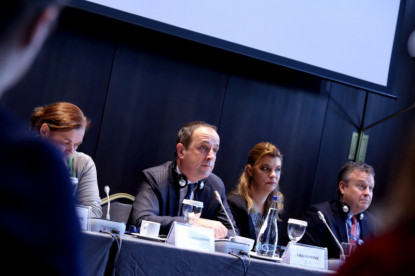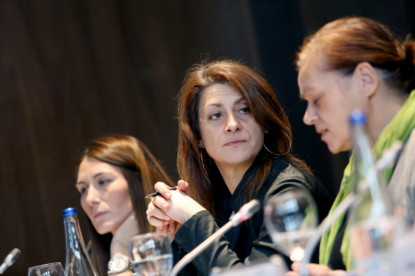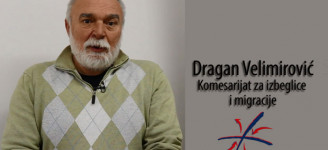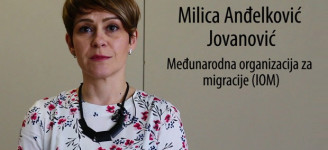The panel discussion on the topic „Empowering Actors for Advancing Protection of Migrants in Practice“ was held.
The panel discussion on the topic „Empowering Actors for Advancing Protection of Migrants in Practice“ was held on December 12, 2017 within the project „Support to Strengthening Migration and Asylum Management in Serbia“ conducted by IOM Office in Serbia with the support of the Embassy of United Kingdom.
The panel discussion was organized with the objective to enable various stakeholders to express their views on the most pressing problems and challenges they encounter daily in the process of providing protection to migrants. This event has managed to gather representatives of decision-makers and experts who have jointly discussed challanges as well as good practice examples in development of policies and services associated with protection of migrants and non-discrimination.
The opening words of the discussion were given by Lidija Marković,
Head of IOM Serbia. The panelists included John Andrew Young, UNCHR Senior Protection Officer, Vesna Dejanović, UNICEF in Serbia’s Project Officer Child Protection, Svetlana Velimirović, Deputy Commissioner for Refugees and Migration of Republic of Serbia, Emilija Joksić, Asylum Office Chief of the Ministry of Internal Affairs of Republic of Serbia, Miroslava Jelačić, NGO „Group 484“ legal analyst and Jelena Hrnjak, NGO „Atina“ representative.
The discussion was moderated by Peter van der Auweraert, IOM Sub-regional Coordionator for the Western Balkans.
The discussion’s objective was to instigate a dialogue on specific problems/challenges that are important for ensuring efficient protection of migrants, both in terms of development of policies and in terms of creation and delivery of services.
Within the panel, three crucial topics have been dealt with:
- Definition of migrants’ vulnerability – approaches and tools in identification and orientation/service delivery
- Advancement of protection – challenges and solutions in the implementation of policies
- Boosting cross-sectoral cooperation – improving orientation capacities
The audience, consisting of representatives of various stakeholders/decision-makers, service providers and donors active in the field of migration, actively joined the discussion. Fourty participants have exchanged their views after each session and juxtaposed their persectives and experiences. It has been particularly significant to hear the views of direct service providers who have managed to convey to the audience the broader picture of everyday life and occurences in reception centers.
The participants have singled out various factors/criteria recognized as important for defining vulnerability of individual groups of migrants. A common approach in defining vulnerable groups of migrants, centered on an individual (services tailored to an individual), has come to prevail, suggesting that personal situation and personal history are important factors affecting someone’s vulnerability, with clear delineation of groups that are more exposed and vulnerable than other categories (women, children, unaccompanied minors).
The panel discussion has been important in enabling the exchange of good practice examples and useful tools for identifying vulnerability. Significant attention has been paid to identifying factors which enhance and contribute to resilience of migrants, in contrast to the previous approach that focused on reduction of vulnerability.
Besides concurrence on the view that it is necessary to additionally develop the existing legal system in order to ensure appropriate protection of migrants, a joint concern has also been expressed regarding assessment of existing capacities and conditions for quality implementation of policies/services. The participants of the panel discussion have additionally exchanged their opinion on the main constraints in the development and implementation of delivery of services that are supposed to respond to special needs in reception and orientation and their views on direction in which the search for durable solutions should be conducted. Finally, the quality of existing cross-sectoral and international cooperation has been discussed and analyzed, particularly taking into account efficient orientation, regarding which views on crucial weaknesses and strenghts have been exchanged.





